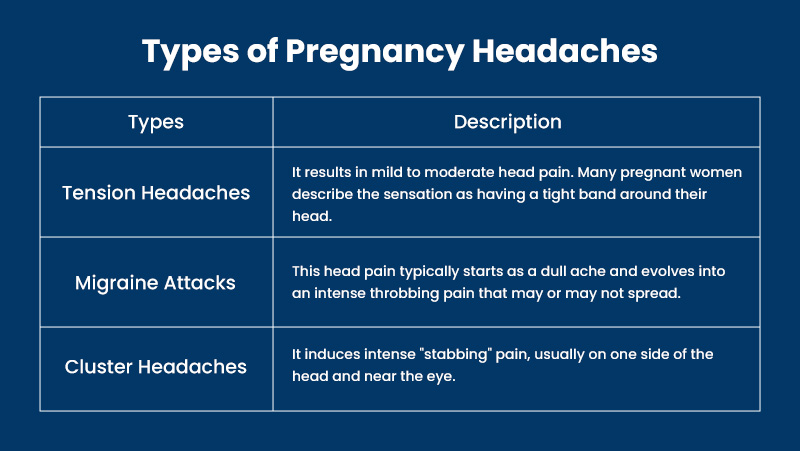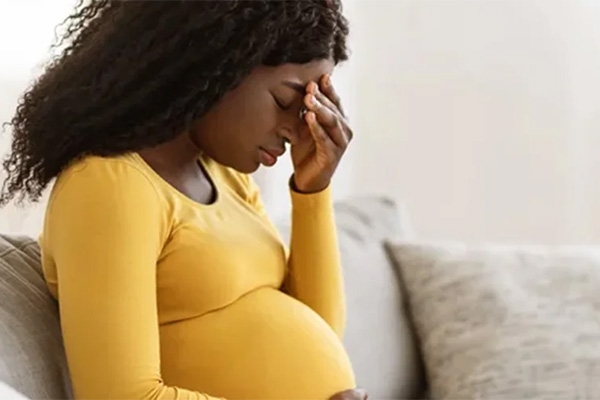Pregnancy is a wonderful journey to celebrate, but not many people talk about the discomforts that might come along the way like— heartburn, back pain, and sometimes even headaches. If you're pregnant and experiencing head pain, you're not alone.
However, the kind of headache might be different from what you usually experience, but most pregnancy headaches are not harmful. Head pain in the first trimester may have different reasons than those in the second or third. Sometimes, these headaches could be a sign of other health issues as well.
While having occasional headaches is normal during pregnancy, is there ever a time to be worried about them? Let’s find out.
Types of Pregnancy Headaches
Most pregnancy headaches fall into the category of "primary headaches," meaning the pain occurs on its own and is not a signal of any other health problem related to the pregnancy. A medical review found that 39% of pregnant and postpartum women get headaches.
Some studies show that around 26% of pregnancy headaches are actually related to tension. If you often get severe headaches or have had a medical history of migraines before, you might be relieved to know that luckily some women have claimed to have fewer headaches when pregnant. However, migraines can lead to problems later in your pregnancy period or even after your baby is born.
Sometimes, pregnant women might also get headaches because of certain other problems like high blood pressure. Therefore, it is important to speak to your doctor as soon as possible.

Symptoms of Headache During Pregnancy
The pain in the head can differ from woman to woman during pregnancy. It usually feels like the following—
- Pain behind one or both eyes
- A slow and dull ache
- Severe pain on one or both sides
- Throbbing or pulsating pain
If you have migraine during pregnancy, it may come along with the following–
- Seeing lines or flashes of light
- Vomiting
- Nausea
- Blind spots
Causes of Pregnancy Headaches— Trimester by Trimester
Pregnancy headaches is quite a common thing when you're pregnant. Studies show that about 39% of women might have headaches during or right after being pregnant. The reason for a headache during pregnancy can be different depending on which stage of the pregnancy you're in.
First Trimester
In the first few months of pregnancy, a woman's body goes through many big changes. There are hormonal changes and, an increase in blood flow with of course gaining weight.
Because of these changes, certain headaches, like tension headaches, might happen more often. Other pregnancy symptoms can also affect these headaches or make them even worse, like—
- Feeling stressed
- Morning sickness/nausea
- Low blood sugar
- Not eating well
- Not being active enough
- Being sensitive to light, which might trigger migraines
- Not drinking enough water
- Changes in vision
- Not getting enough sleep
Also, some foods might be a problem and cause headaches when pregnant. The most common ones include dairy products and chocolate.
Second and Third Trimester
As you move towards your second and third trimesters, the chances of experiencing headaches due to hormonal shifts decrease because the body usually adapts to these changes by then.
Yet, some women might still have tension headaches caused by hormonal shifts during the entire pregnancy.
In the later stages, headaches are more likely to be caused due to the following—
- High blood pressure leading to complications like preeclampsia
- Weight gain
- Not getting enough sleep
- Not having the right sleeping/sitting posture
- Not eating well
Hypertension During Pregnancy

Many pregnant women might have to deal with high blood pressure, known as hypertension. Some might even get a condition called preeclampsia during pregnancy that occurs because of high blood pressure. This happens when suddenly your level of pressure increases after being pregnant for more than 20 weeks.
A common sign of preeclampsia is a headache that doesn't go away. Other signs include the following–
- Morning Sickness/ Nausea
- Blurry vision or seeing spots
- Pain in the upper stomach or abdomen
- Weight gain
- Swelling in the face or hands
- Having trouble breathing
Not everyone with preeclampsia will have all these symptoms. That's why it's important to have prenatal checkups during pregnancy.
Treatments You Can Easily Get in the Comfort of Your Home
If you have a regular headache during pregnancy, there are things you can do at home to feel better. Some simple remedies include—
- Taking a warm bath to relax your muscles.
- Putting a cold or warm cloth on your head for 10 minutes.
- Try gentle exercises and workouts.
- Doing stretches.
- Sitting or standing with correct posture.
- Staying hydrated.
- Taking breaks from looking at screens.
- Getting enough rest.
Keeping track of what you eat every day in a food journal might also help you figure out if certain foods trigger your headaches. Also, try to find yourself the right pregnancy pillow to help you sleep better.
ELI&ELM SPECIAL OFFER!
When to Call for Medical Help
Even though pregnancy headaches are quite normal, there are times when it's important to seek medical help. If your headaches are really bad or won't go away with home remedies, it is better to check with your doctor.
And if you're dealing with other additional problems like feeling dizzy or changes in how you see things, call a medical professional right away. A doctor can only suggest treatment that's safe for both you and your baby.
The Bottom Line

We, at Eli & Elm understand how challenging it can be to experience headaches when you are pregnant. However, following a few simple tips can help eliminate the discomfort. Remember to stay hydrated, get quality sleep, maintain a balanced diet, and practice good posture.
If you experience persistent or severe headaches, it is important to consult with your healthcare provider for professional advice and guidance for a more comfortable and healthier pregnancy journey.












